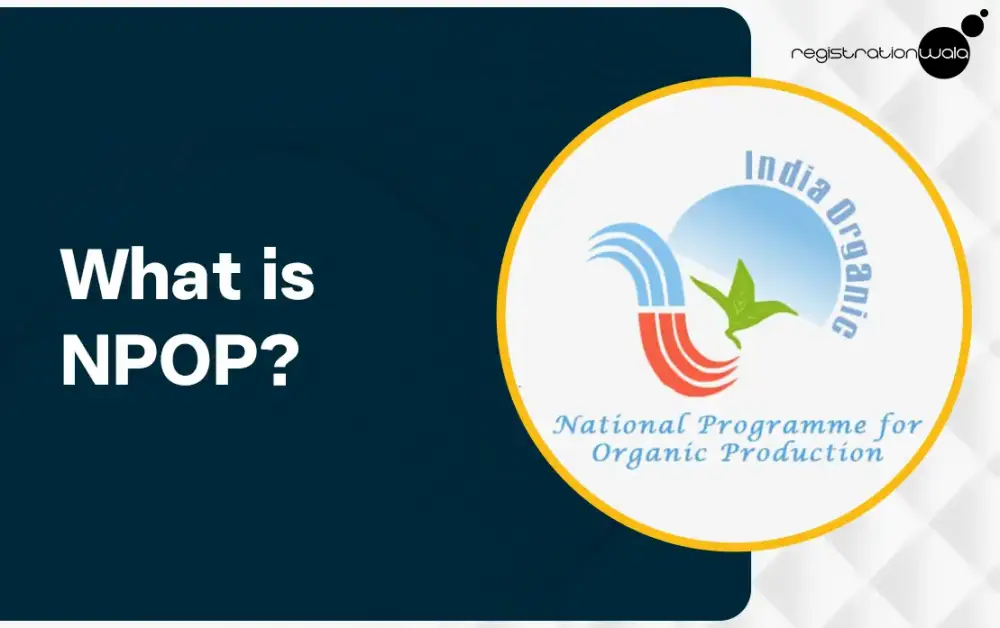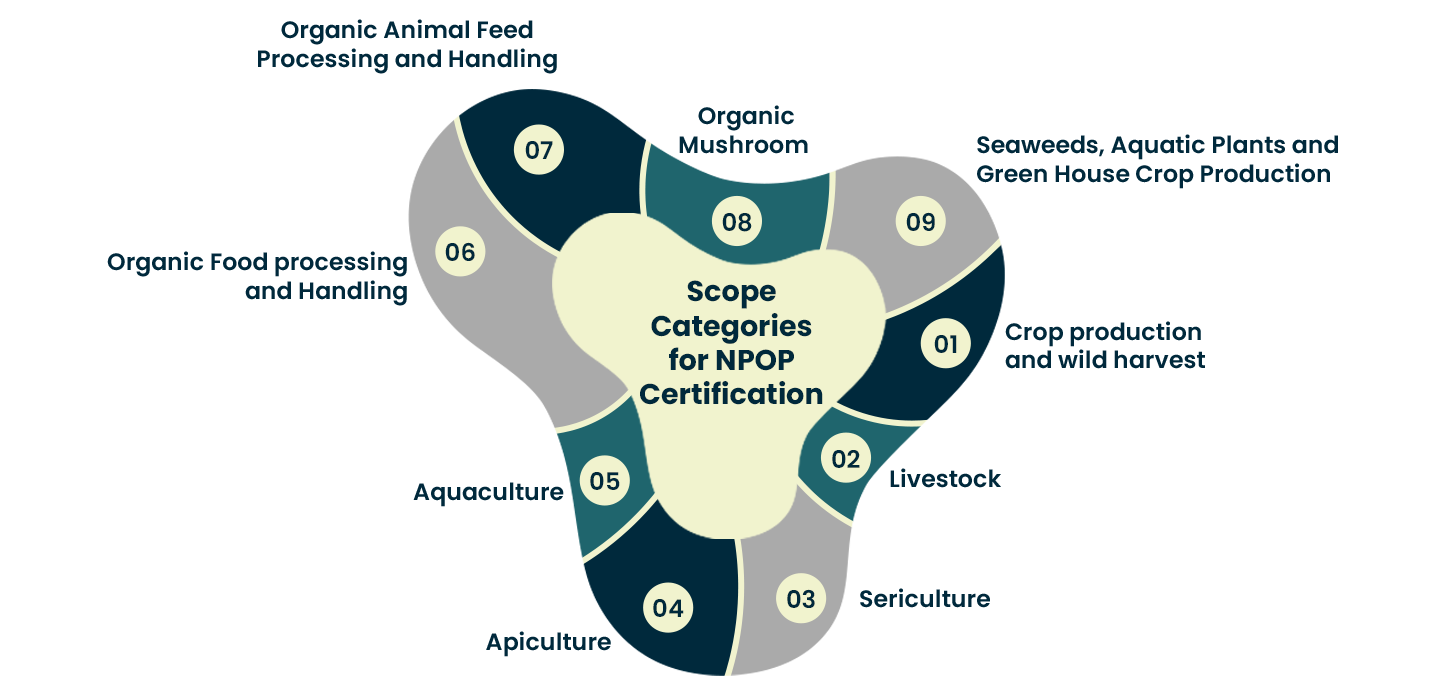What is NPOP?
- December 02, 2024
- Registrationwala

- Home
- /
- Knowledge Base
- /
- Misc
- /
- APEDA Registration
- /
- What is NPOP?
What is NPOP?
Establishing an organic farming business can be a lucrative idea given the growing demand for organic food and the environmental and health benefits of organic farming. According to the Ministry of Commerce, “By 2025 the Indian Organic food business is likely to be a Rs 75,000 crores, a manyfold growth from the current level. Both export & domestic markets are crucial for this to happen. This will mean an additional 12,500 Crore income per annum for farmers, impacting about 5 million farming families on about 6 million ha.”
If you want to start an organic farming business, you must obtain organic food certification which signifies that your food products are organic in nature. For obtaining this certification, you must apply under the NPOP scheme by filing an application with APEDA. Want to know what is NPOP? Check out this blog post!
NPOP Meaning
NPOP full form is National Programme for Organic Production. This programme was launched in 2001 by the Ministry of Commerce and Industry, Government of India. NPOP sets standards for organic production, certification process, and accreditation of certification bodies in the country. It has played an essential role in the regulation as well as promotion of organic farming.
The European Commission and Switzerland have acknowledged the NPOP production and accreditation standards for unprocessed plant products as being on par with their national standards. With these acknowledgments, importing nations accept Indian organic products that have been properly certified by India's recognized certifying authorities.
The Secretariat for the NPOP scheme’s implementation is the Agricultural and Processed Food Products Export Development Authority (APEDA). So, if you want to obtain NPOP certification, you must file an application with APEDA.
Scope Categories for NPOP Certification
NPOP certification can be secured for various scope categories including the following:

-
Crop production and wild harvest,
-
Livestock, Sericulture
-
Apiculture
-
Aquaculture
-
Organic Food processing and Handling
-
Organic Animal Feed Processing and Handling
-
Organic Mushroom
-
Seaweeds, Aquatic Plants and Green House Crop Production
Organic Product Logo under NPOP
The “India Organic” logo is a certification mark for organically farmed food products manufactured in India under the National Programme for Organic Production.
This logo certifies that only products have only been made from organically farmed ingredients and ensures compliance with National Standards for Organic Products (NSOP). This logo can only be used by certified manufacturers, processors and exporters of organic food products.
Objectives of NPOP Scheme
The National Programme for Organic Production has several objectives. We have explained them below for your understanding:
-
The NPOP program facilitates the certification of organic food products in conformity to the standards established under National Standards for Organic Products (NSOP).
-
It has been implemented by the Government of India for the development of organic farming and organic processing in India.
-
It recognizes the certification programme of certification bodies seeking accreditation.
-
It provides a platform for the evaluation of the certification programme for organic agriculture and products, according to government-approved criteria.
-
It provides the National (India Organic) Logo to business entities and individuals and establishes regulations for its use
-
It facilitates certification of organic products in conformity with the organic food standards of the importing countries.
-
The certification process of NPOP includes inspecting operators to make sure that the operation is truly organic and not synthetic. This helps to build consumer confidence.
Eligibility Criteria for NPOP Scheme
The following is the eligibility criteria for NPOP certification scheme:
-
The applicant must be an individual, firm or co-operative society already engaged in or intends to engage in work of certified organic products.
-
They must comply with ISO Guide 65.
-
The certification agencies applying for NPOP accreditation must be actively engaged in programmes pertaining to organic agriculture movement/production and their programmes should’ve been in operation for at least a year.
Documents Required for NPOP Certificate
To apply for a NPOP certificate, the following documents must be filed with the Agricultural and Processed Food Products Export Development Authority (APEDA):
-
Application in the prescribed format
-
ISO 17065-compliant operations and quality manual
-
Operating procedure, format, and checklists standard
-
Authority letter for the person assigning authority
-
Organizational structure
-
Registration certificate
-
Memorandum of Association
-
List of employees and their details
-
Audited balance sheet
-
Accreditation fee
-
Any other documents requested by the authorities
Process for obtaining NPOP Certificate from APEDA
To apply for NPOP certification, the process that must be followed has been explained below in detail:
-
Applicants interested in acquiring accreditation as an agency under the National Programme for Organic Production (NPOP) are required to file an application to the authorized officer in the prescribed format. Along with this, the prescribed application fee must be paid as well.
-
Once the application has been received, the Agricultural and Processed Food Products Export Development Authority will organize a preliminary screening of the application on the National Accreditation Body’s (NAB) behalf.
-
If the application is found to be complete and meets all the requirements, the APEDA will arrange field evaluation by the NAB-nominated Executive Committee.
-
Upon examination of the evaluation report submitted by the Executive Committee, the NAB will decide whether to consider the application for NPOP certification.
-
If the prescribed criteria is met by the applicant with a reasonable tariff structure for inspection and certification, the certification agency will get approval from the Committee.
-
Upon verification, the NPOP certificate of accreditation will be granted to the applicant. It will remain valid for three years from the issuance date.
Conclusion
The National Programme for Organic Production (NPOP) is an initiative of the Ministry of Commerce and Industry, Government of India. It encourages businesses to export organic products. Obtaining an NPOP certification from APEDA signifies that the organic products manufactured in India are at par with the standards established by the importing countries.
If you want to become an exporter of scheduled food products, you must secure APEDA Registration. To secure this registration without any hassle, reach out to our APEDA consultants at Registrationwala.
- 944 views

